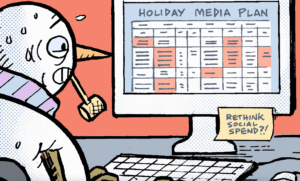 “Data-Driven Thinking” is written by members of the media community and contains fresh ideas on the digital revolution in media.
“Data-Driven Thinking” is written by members of the media community and contains fresh ideas on the digital revolution in media.
Today’s column is written by Michael Nevins, chief marketing officer at Smart.
2018 has been marked by uncommon turbulence, starting with the Facebook-Cambridge Analytica scandal through the recent, ongoing General Data Protection Regulation (GDPR) chaos.
What these twin tornados of controversy have done is shine a huge spotlight on the fundamental cracks in the programmatic advertising foundation. The programmatic industry has ridden the audience targeting and buying wave like a shiny new Maserati, but like many high-performance engines, speed and efficacy often hide a lack of stability and sustainability.
Hopefully, Cambridge Analytica and GDPR will soon be viewed as climactic events marking the shift away from digital advertising’s infatuation with audience targeting. Added to this is Apple’s recent announcement that its Safari web browser is eliminating third-party cookies, making it difficult to do device fingerprinting.
These events may sour some advertisers on targeting as we’ve known it. While performance advertisers will continue to embrace the status quo and likely shift even more of their budgets to the duopoly, where data still reigns, what will brand advertisers do?
I predict that one of the unintended benefits of audience targeting’s current travails will be a return to the overarching importance of context for publishers in luring and pleasing brand advertisers.
Remember our old friend context?
Creating an inviting, well-lit environment in which brand advertisers and consumers could commune had traditionally been a priority. Early murmurs indicate that contextual advertising may return to vogue.
I expect the implications of GDPR to include a consolidation within the third-party data ecosystem as buyers and publishers hedge the toxicity of the open exchanges with more budgets put toward private and direct transactions fueled by first-party data.
I wouldn’t be surprised if some marketers even wind up suspending their programmatic buying until the dust settles on GDPR compliance best practices. Many more marketers will need to at least be comfortable that all of the vendors involved in the media-buying and ad-delivery value chain are playing by the new rules before they will take risks with millions of dollars in penalties at stake, not to mention the negative PR.
Because marketers cannot afford to sit on the sidelines altogether, they will adjust their tactics in the programmatic marketplace in a way that protects them against the dangers and inefficiencies of the open exchanges. They will return to reaping the benefits of contextual targeting, including a move toward vendor transparency and closer relationships with content owners. They will seek out more content sponsorships and true native opportunities, which will generate better user experiences.
It is not hyperbolic to assert here that context will once again be king. Instead of being susceptible to the industry’s latest shiny new toy, it’s time for publishers and buyers to take charge by having a better understanding of context and how it can lead to better performance and brand metrics.
In the past, we’ve defined contextual targeting through parameters such as site category, article content sentiment and article content details, such as a company or competitor mention, for example. But with all the recent advances in machine learning and ad tech, the return to contextual targeting will reveal an even more advanced, finely honed practice.
Ever-increasing CPU power is making machine learning even more impactful, allowing more signals to be processed faster. This technology democratization benefits the entire industry. The more signals processed, the more nuanced we can be about context. Beyond a better understanding of adjacent content, we can open the aperture further to consider additional contextual signals such as device type, location, touchscreen, ad density, ad quality and user source.
Brands can’t rely on buy-side tech alone to help them find this context. And indeed, publishers shouldn’t rely on buy-side tech either. It’s time for publishers to present more refined insight into their content and the nuanced understanding of the context in which their clients’ ads can appear.
If they do, it will have a salutary impact on their businesses and diminish their financial vulnerability to the hazards of relying too heavily on the open exchanges and walled gardens.
Follow Smart (@SmartAdServerEN) and AdExchanger (@adexchanger) on Twitter.













